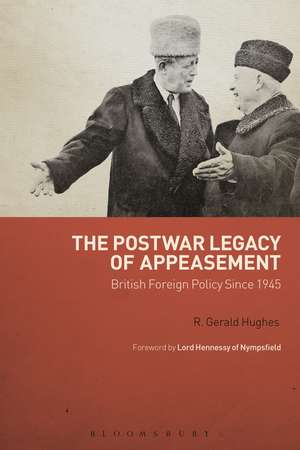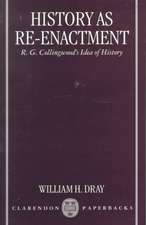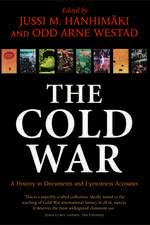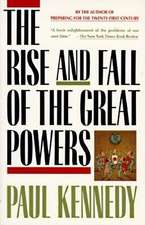The Postwar Legacy of Appeasement: British Foreign Policy Since 1945
Autor R. Gerald Hughesen Limba Engleză Paperback – 15 ian 2014
| Toate formatele și edițiile | Preț | Express |
|---|---|---|
| Paperback (1) | 240.98 lei 3-5 săpt. | |
| Bloomsbury Publishing – 15 ian 2014 | 240.98 lei 3-5 săpt. | |
| Hardback (1) | 833.88 lei 6-8 săpt. | |
| Bloomsbury Publishing – 15 ian 2014 | 833.88 lei 6-8 săpt. |
Preț: 240.98 lei
Preț vechi: 307.43 lei
-22% Nou
Puncte Express: 361
Preț estimativ în valută:
46.11€ • 49.31$ • 38.45£
46.11€ • 49.31$ • 38.45£
Carte disponibilă
Livrare economică 28 martie-11 aprilie
Preluare comenzi: 021 569.72.76
Specificații
ISBN-13: 9781780935836
ISBN-10: 1780935838
Pagini: 352
Dimensiuni: 156 x 234 x 23 mm
Greutate: 0.52 kg
Ediția:New.
Editura: Bloomsbury Publishing
Colecția Bloomsbury Academic
Locul publicării:London, United Kingdom
ISBN-10: 1780935838
Pagini: 352
Dimensiuni: 156 x 234 x 23 mm
Greutate: 0.52 kg
Ediția:New.
Editura: Bloomsbury Publishing
Colecția Bloomsbury Academic
Locul publicării:London, United Kingdom
Caracteristici
Re-evaluates the relationship between British society and Appeasement
Notă biografică
R. Gerald Hughes is Reader in the Department of International Politics at Aberystwyth University, UK.
Cuprins
List of figuresAcknowledgementsForeword by Lord Hennessy of NympsfieldIntroduction: Present histories and past follies: the legacy of appeasement and British foreign policy since 19451. In the footsteps of Cromwell: an empire against two evils, 1941-532. Churchill and Locarno, Eden and Geneva: the limits and possibilities of diplomacy3. 'I have never thought Nasser a Hitler': Suez and the shadow of Munich4. 'I will be no Mr. Chamberlain': Harold Macmillan and Berlin, 1958-625. Helsinki, 1975: Nuclear age Westphalia, Versailles or Munich?6. 'We have ceased to be a nation in retreat': Margaret Thatcher, the Falklands War and the negation of Munich and Suez7. In pursuit of a 'New World Order': liberating Kuwait, 1990-18. Appeasement and the politics of obstructionism: Britain and the dissolution of Bosnia9. 'History will be my judge': Blair's wars and the moral case against appeasementConclusion: Appeasement, British foreign policy and history BibliographyIndex
Recenzii
Hughes has made a major contribution to understanding British foreign policy in the post-war era ... [A] highly original work that will reward study by anyone interested in the history of international relations.
Gerald Hughes' first-rate book deserves to be read and digested not only by historians and international relations specialists, but also by politicians, their speech writers and their diplomats.
Hughes has produced a readable account of the uses and abuses of the appeasement analogy, reminding us of the dangers of history turning into a political battleground on which the decisions for the future are made.
[Hughes] presents the argument in a manner likely to retain the interest of the reader whilst resisting the temptations towards over simplification. It is a highly interesting book that would be of interest to scholars and students alike.
Gerald Hughes' first-rate book deserves to be read and digested not only by historians and international relations specialists, but also by politicians, their speech writers and their diplomats.
Hughes has produced a readable account of the uses and abuses of the appeasement analogy, reminding us of the dangers of history turning into a political battleground on which the decisions for the future are made.
[Hughes] presents the argument in a manner likely to retain the interest of the reader whilst resisting the temptations towards over simplification. It is a highly interesting book that would be of interest to scholars and students alike.













